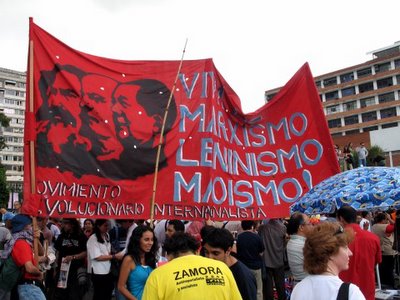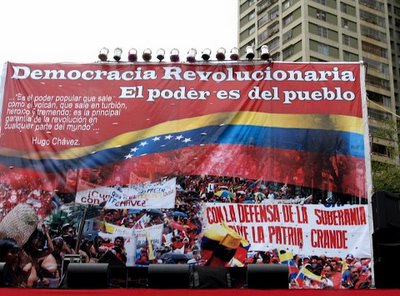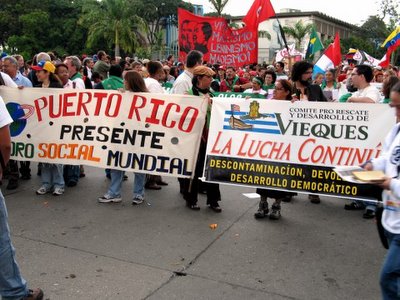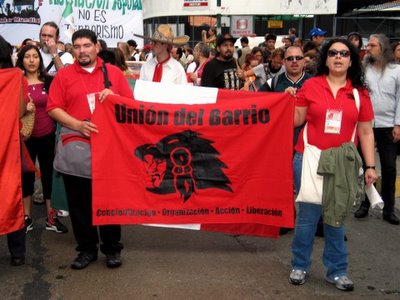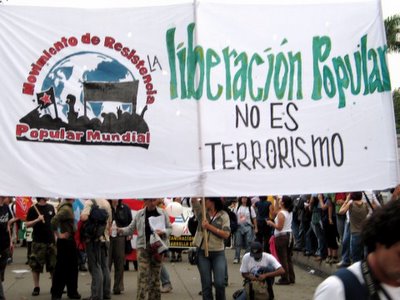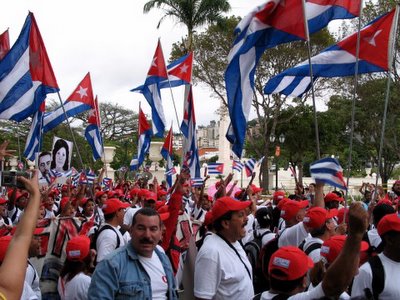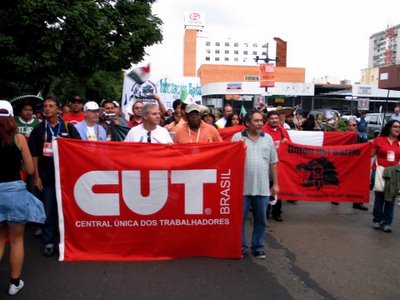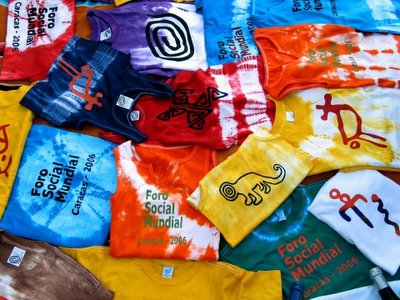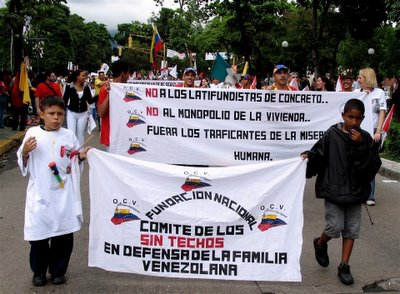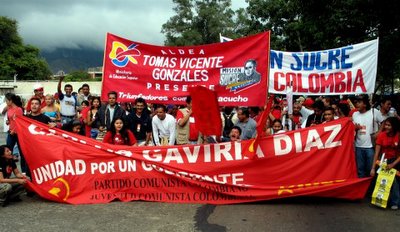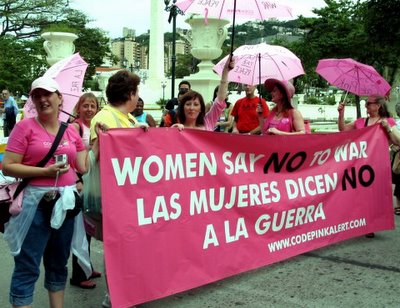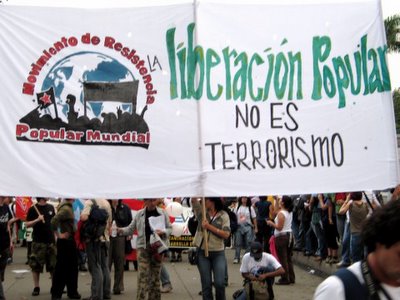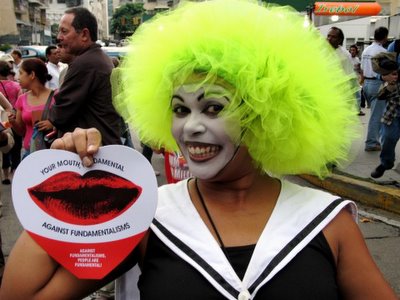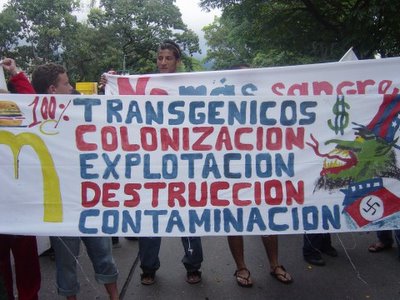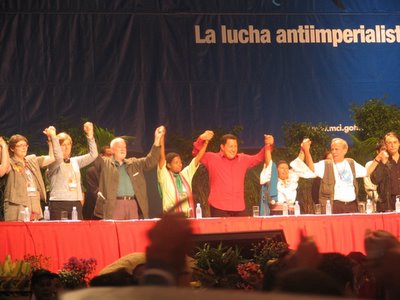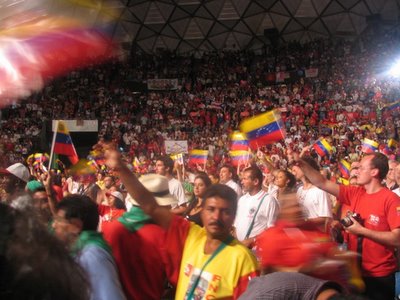To the uninformed, the negative attacks on Venezuelan President Hugo Chavez by televangelist Pat Robertson, who called for Chavez’s assassination, and U.S. Secretary of Defense Donald Rumsfeld, who last week compared the popular Latin American president to Adolph Hitler, are a major cause for alarm.
"I mean, we've got Chavez in Venezuela with a lot of oil money. He's a person who was elected legally – just as Adolf Hitler was elected legally – and then consolidated power and now is, of course, working closely with Fidel Castro and Mr. Morales and others," said Rumsfeld during a recent National Press Club address recently.Pat Robertson, host of Christian Broadcasting Network’s The 700 Club and founder of the Christian Coalition of America, called for the assassination of Venezuelan President Hugo Chavez, during an Aug. 22 broadcast.
"You know, I don’t know about this doctrine of assassination, but if he thinks we're trying to assassinate him, I think that we really ought to go ahead and do it .... And without question, this is a dangerous enemy to our south, controlling a huge pool of oil that could hurt us very badly. We have the ability to take him out, and I think the time has come that we exercise that ability," said Robertson.In the Afro-Venezuelan village of Telmas, artisans sell their artwork and jewelry in a community gift shop. Under President Chavez, all Venezuelans are taught that Africa is their motherland.
During the Feb. 2 edition of Fox News’ Hannity & Colmes, Robertson reiterated his call for the assassination of Venezuelan President Hugo Chavez.
However, to observers of President Chavez's Bolivarian Revolution, it’s clear that what U.S. officials and right-wingers like Robertson fear most about the quiet revolution taking place in Venezuela is the "Robin Hood effect" that country’s constitution is bringing to the grassroots and indigenous people there.
As a result of the constitution adopted in 1999 the grassroots are poised to receive an array of benefits once reserved only for the rich and bourgeoisie.
However, it was the constitution which led to the failed 2002 coup — the kidnapping of Chavez and the three-day installation of Pedro Carmona, president of Fedecámaras, the Venezuelan Federation of Chambers of Commerce.
In short, Chavez scuttled the capitalistic society once prevalent in Venezuela in favor of a democracy based on redistribution of the wealth and free social services to poor and indigenous Venezuelans.
Carmona and the opposition's short-lived moves during the temporary coup lend credence to Chavez's belief that the U.S. government and private corporations were so determined to retain the old guard — the oligarchy of which Carmona was a member — that President Bush, whom Chavez calls "Mr. Danger," and his administration secretly supported the coup.
Carmona's first decree reversed all of the major social and economic policies that comprised Chavez's "Bolivarian Revolution," including loosening Chavez's credit controls and ending his oil price quotas by raising production back to pre-Chavez levels. Carmona also dissolved both the National Assembly and the Venezuelan judiciary, while reverting the nation’s name back to República de Venezuela.
But it was the grassroots, women, primarily, who came down from the mountains by the thousands and surrounded the palace demanding the return of Chavez. After a failed election recall waged by the opposition, the work of redistributing the wealth and the land, as well as turning over control of social services to the grassroots, began in earnest.
"As of mid-2005, the National Technical Office has issued over 84,000 titles to 126,000 families, benefiting about 630,000 barrio inhabitants. With a total estimated barrio population of around 10 million, the project still has a ways to go. Once most barrio inhabitants (not all can receive titles because many homes are on unstable ground or have competing ownership claims) have received titles, though, this will be one of the government's greatest impact programs, aside from public health and public education. This would be a far greater impact than the public housing project could ever hope to have," the Council on Hemispheric Affairs reported.
Recently, while touring Venezuela with the Global Women Strike! and representing the SF Bay View National Black Newspaper, this writer became an eyewitness to history, to the social revolution that continues to unfold in Venezuela.
Chavez's pronouncement that the "Revolution has the face of a woman" reverberated from the teeming Venezuelan capital of Caracas to the suburbs of Los Teques and as far away as Talmas.
Leading the revolution on the ground and taking the Strike on tour to see the revolution in action was Juanita Romero, called "Madre" (mother). Romero is over the technical office that regulates the Urban Land Committee based in Guacaipuro. "Fight, fight, fight, until you win. The power belongs to the people," Madre chanted.
"Gender equality is a reality here. In the new South America, we are trying to build another world, because humankind is in danger. We must fight for the native, indigenous people, the Navajos, Arapas," Nora Castenedas, founder of Banmujer (Women’s Bank), told participants at a workshop on Latin American organized by the Global Women Strike!
"Africa is our motherland. We were told Spain was our motherland. That's not so. It's Africa." The Strike coordinated the activities of a delegation of 70 men and women, representing 11 countries, worldwide, and held several workshops during the recent World Social Forum in Venezuela.
The Strike had last year arranged a tour of the U.S. for Castenedas, which included addressing the United Nations.
"We just passed our constitution." That constitution was constructed by our people, who became sovereign through the struggle of our African ancestors more than 500 years ago. They fought the Europeans.
"As for women, we have done a lot for women in our country. It was the women who asked our president to create the National Women’s Institute and the Women’s Development at the Banmujer. We promote the grassroots and we know that if these women succeed, we will succeed," said Castenedas.
In addition to the announced 900 land titles to be awarded in March 2006, Venezuelan President Hugo Chavez last Thursday announced that the provisions of Article 88 would be enforced, without interference from advisory councils, which previously made all the decisions about implementation and handled the money given by the president for various projects. The president affirmed that such decisions must be made by both the council and the grassroots committee leaders.
According to Article 88, "The State guarantees the equality and equitable treatment of men and women in the exercise of the right to work. The state recognizes work at home as an economic activity that creates added value and produces social welfare and wealth. Housewives are entitled to Social Security in accordance with law."
Members of the Global Women Strike! shouted with joy upon hearing the news that the law adopted the basic goal of the Strike, which it has worked for since 1972, to compensate women who have done unwaged, caring work for free.
Other articles in the constitution guarantee free health care, education — at all levels — food security and land titles. In other words, the Venezuelans are getting their 40 acres and a mule, and more.
Juanita Romero, or "Madre," the director of the Urban Land Committee in Gupicaipuro, took Strike members on tour to see the revolution first hand. At the Land Committee designated building, Romero explained that several community leaders would oversee the land titles in their respective communities.
Traveling by bus, observers were brought to a military installation where Madre explained that people who live in houses that are in danger of being washed away by the rain are housed there until permanent housing can be found.
"If a person is homeless, the government will give that citizen 5 million bolivars ($2,610.70 U.S. dollars) to put down on a house or to purchase a home," Madre explained.
Health Clinics serve residents in the barrios or the suburbs. All health care is free.
At a local university, Strike members learned that all education, even college education, is free.
"We are working on changing decades of discrimination in education to make it possible for students to go to college. State policy is prepared to save education for all our citizens," a university official said.
"We are changing the way students look at professions. For example, if you are studying to be a lawyer, don’t expect to make millions of dollars. We are training lawyers to provide integrated community services and to work for justice."
The food security co-op serves at least 150 children up to age 12 and expectant mothers every day. Families can work at the food co-op for three months and feed their families with the food that is prepared. They also receive on the job training in culinary arts.
The food comes from the state in its raw form, and organic meals are cooked from scratch. Another food program feeds people who have specific illnesses and need specific diets, such as those with diabetes.
Each program is run by committees formed by nine members and nine substitutes, including a president and vice-president, from each participating community. The committees focus on providing direct services to the people in the areas of health, employment, education, culture, sports, environment and water quality.
The last stop on the tour was to Talmas, a village of Afro-Venezuelans. The co-op in Talmas focused on artisans who were being trained to make art, artifacts and jewelry. They sold their goods at the community gift shop.
"Fight, fight, fight until you win. Those who organize have the power. The power belongs to the people," Madre began chanting. “Don’t assume something is impossible just because you’ve never tried it before,” she said of the Bolivarian Revolution.
CC Campbell-Rock, a native New Orleanian, veteran journalist and Katrina evacuee, is the new editor of the Bay View. She has just returned from nearly two weeks in Venezuela, the first attending the World Social Forum and the second touring the countryside to see the revolution in action. Email her at campbellrock@sfbayview.com.

